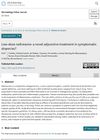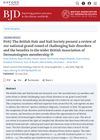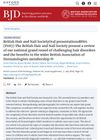Naltrexone
aka - low dose naltrexone
Research
20 / 166 resultsresearch The Opiate Antagonist, Naltrexone, in the Treatment of Trichotillomania
Naltrexone did not significantly reduce hair pulling but improved cognitive flexibility.
research Novel Treatment Using Low-Dose Naltrexone for Lichen Planopilaris
Low-dose naltrexone helps reduce symptoms and slow down lichen planopilaris without side effects.
research Trichotillomania Successfully Treated With Risperidone and Naltrexone: A Geriatric Case Report
Trichotillomania was successfully treated with risperidone and naltrexone.

research Low-Dose Naltrexone: A Novel Adjunctive Treatment in Symptomatic Alopecias?
Low-dose naltrexone might be a cheap and effective additional treatment for hair loss with scalp discomfort due to its anti-inflammatory effects and few side effects.

research Oral Low-Dose Naltrexone in the Treatment of Frontal Fibrosing Alopecia and Lichen Planopilaris: An Uncontrolled Open-Label Prospective Study
Low-dose naltrexone may help reduce redness in certain scalp conditions.

research Biopharmaceutical Performance of DiluCap: A Line of Functional Excipients Enhancing Dissolution Profiles of Minoxidil, Finasteride, Melatonin, and Naltrexone
DiluCap improves how quickly minoxidil and finasteride dissolve and controls the release of melatonin and naltrexone.

research Literature Review: Naltrexone: New Use for an Old Drug
Naltrexone shows promise as a safe treatment for a type of hair loss called lichen planopilaris.
research Reversible Hair Loss in Lichen Planopilaris: Regrowth With Low-Dose Naltrexone and Platelet-Rich Plasma
Low-dose naltrexone and platelet-rich plasma can regrow hair in lichen planopilaris.

research Frontal Fibrosing Alopecia: An Update on Pathogenesis, Diagnosis, and Treatment
The cause of Frontal Fibrosing Alopecia is unclear, diagnosis involves clinical evaluation and various treatments exist, but their effectiveness is uncertain.

research Divergent Neuroactive Steroid Responses to Stress and Ethanol in Rat and Mouse Strains: Relevance for Human Studies
Stress and alcohol affect brain chemicals differently in rats, mice, and humans, influenced by genetic differences.

research Trichotillomania And Trichophagia: Modern Diagnostic And Therapeutic Methods
Better-designed, long-term studies are needed to optimize treatment for trichotillomania and trichophagia.
research Recent Advances in the Treatment of Trichotillomania (Hair-Pulling Disorder)
New drugs like N-acetylcysteine and dronabinol show promise for treating hair-pulling disorder.

research Metabolic Syndrome – A New Definition and Management Guidelines: A Joint Position Paper by Various Polish Medical Societies
The Polish medical societies have redefined metabolic syndrome and recommend lifestyle changes, certain medications, and possibly bariatric surgery for treatment. They also discuss managing related health conditions.

research Lichen Planopilaris and Frontal Fibrosing Alopecia: Review and Update of Diagnostic and Therapeutic Features
The document concludes that more research is needed to find effective treatments for Lichen planopilaris and Frontal fibrosing alopecia.

research Reply
The document concludes that doctors should monitor children's brain development when treating hemangiomas with interferon alfa and consider stopping the treatment if problems arise, while also exploring drugs that might counteract side effects.
research Update on the Treatment of Trichotillomania
N-acetylcysteine and memantine are recommended as safe and effective treatments for trichotillomania.

research The British Hair and Nail Society Presents a Review of Our National Grand Round of Challenging Hair Disorders and the Benefits to the Wider British Association of Dermatologists Membership
The review helps improve diagnosis and treatment of challenging hair disorders.

research The British Hair And Nail Society Present A Review Of Our National Grand Round Of Challenging Hair Disorders And The Benefits To The Wider British Association Of Dermatologists Membership
The grand round helps improve diagnoses and suggests new treatments for hair disorders.

research Update on the Treatment of Trichotillomania
Effective treatments for trichotillomania include cognitive-behavioral therapy, certain medications, and alternative support tools.
research Hair-Pulling Disorder
New treatments for hair-pulling disorder focus on personalized approaches and combining therapies for better results.